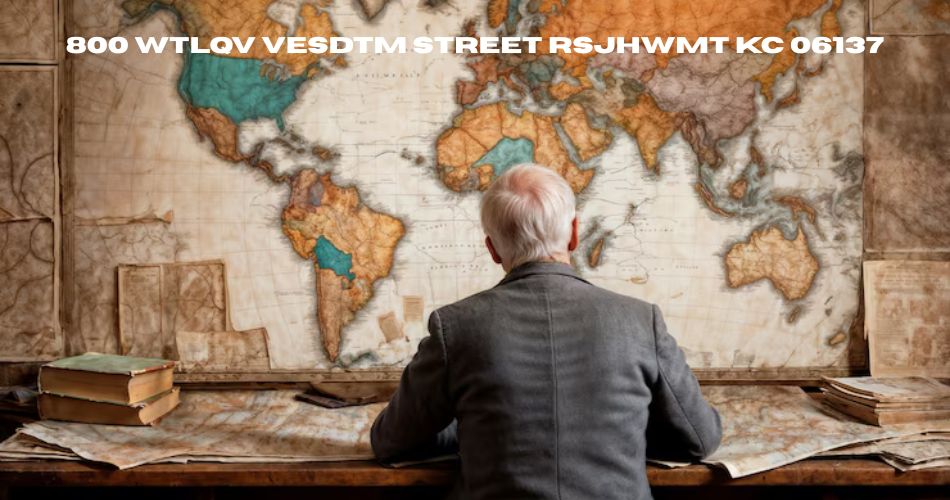In the digital age, where we rely heavily on search engines and map services, encountering a confusing and unexplained address like 800 wtlqv vesdtm street rsjhwmt kc 06137 can spark curiosity, confusion, and even conspiracy theories. It sounds official—complete with a number, a street, an odd city name, a state abbreviation, and a ZIP code. But upon closer inspection, the address collapses under the weight of scrutiny. Is it real, fictional, or an elaborate digital hoax? This article dives deep into the structure, possible origins, and implications of this strange location to uncover what lies beneath its surface.
Breaking Down the Anatomy of the Address
Every address around the world follows a specific format so that it can be located, indexed, and serviced. In the United States, that format includes a street number, street name, city, state, and ZIP code. However, in the case of 800 wtlqv vesdtm street rsjhwmt kc 06137, each component seems to defy logical urban planning. The street name “WTLQV VESDTM” is not recognized in any public database, the city “RSJHWMT” is not mapped to any known region, and the ZIP code 06137 is either invalid or misassigned. This raises an immediate red flag that the address might not have any physical existence.
Geolocation and the Power of Believability
What makes an address believable is how close it mimics real-world locations. The use of a number like “800” makes it sound plausible—it’s a common block number used in many addresses. “KC” stands for Kansas City, which adds to the air of authenticity. But when you try to verify this location through Google Maps or USPS, nothing comes up. This means 800 wtlqv vesdtm street rsjhwmt kc 06137 likely doesn’t exist in any governmental, postal, or real estate system. Yet, its structure is intentionally designed to trick algorithms and users alike into thinking it’s legitimate.
The Rise of Fake Addresses in the Internet Era
The online world is riddled with placeholders, test data, and even intentionally fake content. Developers often use random data for form testing, while some marketers use fake addresses for location-based SEO manipulation. There are also cases where addresses like 800 wtlqv vesdtm street rsjhwmt kc 06137 appear in product descriptions, map screenshots, or fake real estate listings just to generate user interaction or engagement. The use of such addresses can create confusion, raise suspicion, and sometimes even mislead potential buyers or clients who fail to verify them.
Is It a Cryptographic Code or Just Gibberish?
Another theory often associated with addresses like 800 wtlqv vesdtm street rsjhwmt kc 06137 is that they could be coded messages. The sequence of letters “WTLQV VESDTM” and the city “RSJHWMT” resemble jumbled or encrypted text rather than real words. Some online communities believe these types of strings are part of Alternate Reality Games (ARGs), where players are invited to decode mysteries through clues scattered across websites, videos, and sometimes fake physical addresses. In these games, the address might lead to the next step in a puzzle—but in most everyday contexts, it is simply meaningless.
The Role of AI and Synthetic Data Generation
AI-generated text and synthetic data are increasingly used to fill out forms, simulate environments, or generate large-scale test data. Address generation is one of the many uses of these tools. A model may randomly generate something like 800 wtlqv vesdtm street rsjhwmt kc 06137 to complete a template, with no intention for it to represent a real place. Unfortunately, when that information is left unedited or is indexed by search engines, it takes on a life of its own. People stumble upon it, try to research it, and the mystery deepens purely through exposure and engagement.
Search Engine Confusion and Digital Echo Chambers
Once an unusual address is indexed by search engines, it becomes part of the digital landscape. If multiple users search for 800 wtlqv vesdtm street rsjhwmt kc 06137, the search engines begin to treat it as a trending term. Websites may then start to generate automated content around it, creating a feedback loop. Before long, this fictional place becomes a point of digital folklore, even though it started from nothing. This phenomenon shows how easily fiction can masquerade as fact on the internet, particularly when SEO tools pick up unusual data and propagate it across platforms.
The Psychological Effect of the Unknown
People are naturally intrigued by things that don’t make sense. When we see something like 800 wtlqv vesdtm street rsjhwmt kc 06137, it taps into our curiosity. It feels like a glitch in the matrix—a puzzle that begs to be solved. This is why such addresses gain traction even when they have no real-world significance. The human brain doesn’t like ambiguity; it seeks patterns and explanations. And when those explanations aren’t readily available, speculation takes over.
Fictional Addresses in Literature and Pop Culture
Throughout history, writers and filmmakers have used fictional addresses to tell stories without referencing real locations. Sherlock Holmes lived at 221B Baker Street before it became a tourist attraction. Television shows like “The Simpsons” use vague or fabricated locations to avoid conflicts with real towns. Similarly, 800 wtlqv vesdtm street rsjhwmt kc 06137 could be someone’s creative outlet—either part of a developing story or an Easter egg hidden in digital content. Its value then isn’t in its location but in its mystery.
Digital Safety and Verifying Suspicious Locations
Encountering a suspicious address online should prompt users to do their due diligence. Whether it’s in a job offer, real estate listing, or promotional email, verifying the location can save you from scams or wasted time. For example, if you come across 800 wtlqv vesdtm street rsjhwmt kc 06137, a quick check through USPS, Google Maps, or county property records will show you it’s not real. You should be cautious with any website or individual using this type of data as a point of contact or transaction.
What Can Be Learned from This Digital Oddity
The existence and spread of addresses like 800 wtlqv vesdtm street rsjhwmt kc 06137 reveal important truths about the internet. It’s a place where information is copied, morphed, and sometimes fabricated entirely. It also shows that algorithms—while powerful—are not perfect. They can propagate fiction as quickly as fact if left unchecked. This teaches us the importance of critical thinking, verification, and digital literacy in the modern world.
Conclusion
While 800 wtlqv vesdtm street rsjhwmt kc 06137 may not exist on any map, it has found its place in online conversations, digital mysteries, and search engine results. It’s a reminder that not everything we find online is what it appears to be. Some things are planted for fun, others for function, and some purely by accident. In this case, the address is most likely a mix of algorithmic randomness and human curiosity—a perfect storm that gave life to a place that never was. As we move forward in the digital age, this story teaches us to question, research, and never take data at face value.
Read More Trending Topic:
- Gimkit: A Fun and Interactive Learning Tool for Students
- Gimkit Join: Revolutionizing Classroom Engagement with Game-Based Learning
- Gimkit Home: Transforming Education with Gamified Learning
- Gimkit Code: A Complete Guide to Enhancing Student Engagement
- Gimkit Host: The Ultimate Guide to Hosting Interactive Learning Games



